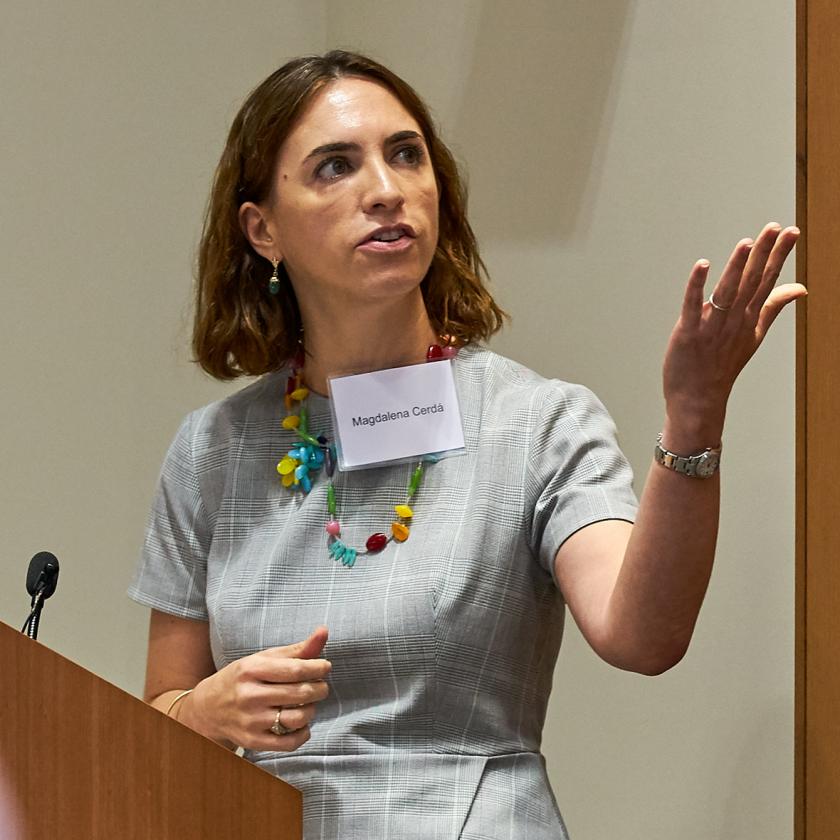
Center for Opioid Epidemiology & Policy News
NYU Langone’s Center for Opioid Epidemiology and Policy (COEP) invites you to join our mailing list to receive our monthly newsletter, which features news in the field, center updates, and research and media highlights.
Here are some recent research findings and highlights from our center’s investigators.
COEP Director, Magdalena Cerdá, Featured in an Episode of CBS Sunday Morning
COEP Director Magdalena Cerdá was featured in an episode of CBS Sunday Morning. She talks with CBS correspondent David Pogue about the decrease in overdose deaths in the United States in the past year. She explains that this decrease is potentially related to increased access to naloxone, a shift away from injecting drugs, and a general decline in adolescent and young adults using drugs like fentanyl. Watch the video here.
Interactive Associations of Cannabis and Alcohol Outlet Densities with Assault Injuries in California: A Spatiotemporal Analysis
In a recent study, COEP members Ellicott Matthay, Rafael Charris Dominguez, Victoria Jent, and colleagues examined the impact of recreational cannabis outlets on neighborhood-level assault injury rates in California and whether alcohol outlet density moderated these associations. Using statewide data (2017–2019) and Bayesian spatiotemporal analyses, the study team estimated that if recreational cannabis outlets were never introduced, non-firearm assault injuries would have been 1.63 per 100,000 lower but firearm assault injuries would have remained unchanged. Alcohol outlet density did not moderate these associations, but hypothetical reductions in alcohol outlets were associated with fewer firearm and non-firearm assault injuries. These findings suggest the introduction of recreational cannabis outlets may have contributed to a small increase in non-firearm assault injuries. Read more in the American Journal of Epidemiology here.
Agent-Based Model of Combined Community- and Jail-Based Take-Home Naloxone Distribution
A recent study involving COEP faculty Samuel Friedman highlights the significant impact of take-home naloxone (THN) distribution at jail release in reducing opioid-related overdose deaths. Using an agent-based model with data from Cook County, Illinois (2014-2020), researchers found that THN distribution at jail release averted a median of 11.7% of opioid-related overdose deaths. The intervention was also economical, with costs under $15,000 per death averted in all scenarios. However, the presence of willing and capable bystanders at an opioid overdose event was an important factor in program effectiveness. This highlights the need to reduce the proportion of people who use drugs alone and the value of public health messaging to support THN deployment and train potential bystanders in proficient THN use. This study underscores the potential of THN distribution as an economical and effective strategy to address the opioid crisis. Read more in JAMA Network Open here.
Equity and Justice Award Received by Ellicott Matthay
COEP faculty Ellicott Matthay received the "Equity and Justice Award" at the 2024 National Conference of the Research Society for the Prevention of Firearm-Related Harms for her talk titled “Quasi-Experimental Evaluation of the Impact of Los Angeles Cannabis Social Equity Policies as an Economic Support Intervention to Prevent Community-Level Firearm and Nonfirearm Assault Injuries”. Read more about the presentation here.
Discriminatory enforcement of cannabis prohibition under national cannabis prohibition contributed to disproportionate arrests, convictions, and incarceration of racially and ethnically minoritized people. To address these harms, 15 US states have incorporated social equity provisions into their recreational cannabis legalization policies with the goal of channeling some of the economic benefits of the newly legal cannabis industry to communities disproportionately impacted by the War on Drugs. These same communities experience disproportionate rates of community firearm violence. Despite the established links between income, employment, and community violence, no published research had assessed whether cannabis social equity provisions reduce community violence or racial/ethnic inequities in these outcomes. The study team, including COEP members Ellicott Matthay, Rafael Charris Dominguez, and Matthew Lee, estimated the impacts of Los Angeles’s cannabis social equity provisions on community-level rates of firearm and non-firearm assault injuries and found no detectable effects. This finding is supported by documentation of several implementation challenges associated with the program. However, most large-scale state programs remain unevaluated and warrant further investigation.
Photovoice Project Collaboration with OnPoint
Funded by the Center for Drug Use and HIV/HCV Research (CDUHR) and the Center for AIDS Prevention Studies (CAPS), COEP faculty Suzan Walters and team collaborated with their community partner OnPoint on a PhotoVoice project at two OnPoint locations in Washington Heights and Harlem. OnPoint NYC is a community-based harm reduction organization that hosts overdose prevention center (OPC) programs where individuals who use drugs can come for the purpose of overdose prevention. PhotoVoice is an inclusive and participatory research and advocacy methodology that amplifies community voices through captioned photographs taken by community members themselves. It creates opportunities to raise awareness about our lives and concerns in a creative and action-oriented way. The images will be released shortly in an online gallery.
Our Research

Our Team
